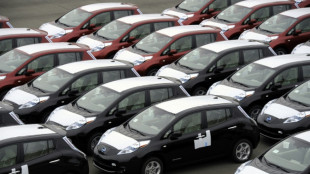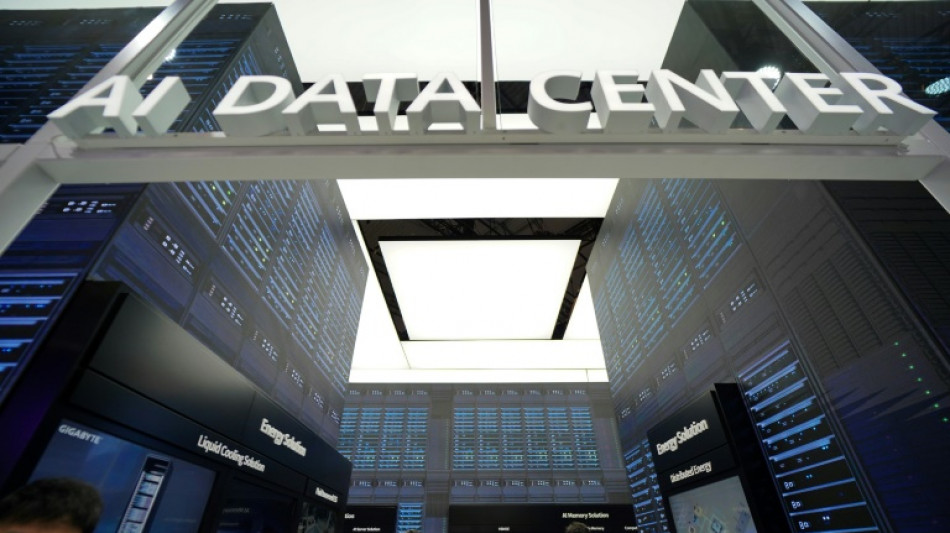
-
 Passion for hand fans sizzles in burning Spanish heat
Passion for hand fans sizzles in burning Spanish heat
-
Drought-hit Serbian raspberry farmers fear 'catastrophic' future

-
 Jadeja hailed for taking India close but Gavaskar rues lack of risk
Jadeja hailed for taking India close but Gavaskar rues lack of risk
-
'Dialogue' must be at heart of China, Australia ties, PM tells Xi

-
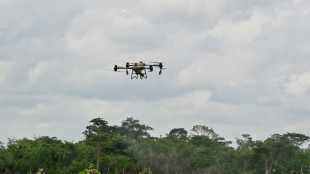 Ivory Coast farmers hope tech tempts jaded youth back to fields
Ivory Coast farmers hope tech tempts jaded youth back to fields
-
France's new star Lanier ready for home pressure at badminton worlds

-
 Hong Kong leader backs same-sex couples' rights bill
Hong Kong leader backs same-sex couples' rights bill
-
Nvidia says it will resume sales of 'H20' AI chips to China
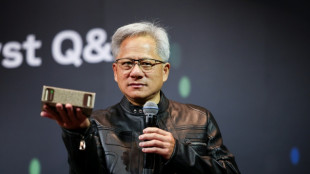
-
 Egypt grand museum delay puts tourism hopes on hold
Egypt grand museum delay puts tourism hopes on hold
-
Asian markets mixed as China's economy meets forecasts

-
 China's economy grows 5.2% on trade war truce
China's economy grows 5.2% on trade war truce
-
Divided EU weighs action against Israel over Gaza war

-
 'Butter': the foodie feminist bestseller skewering sexism in Japan
'Butter': the foodie feminist bestseller skewering sexism in Japan
-
France, Eq. Guinea to clash at UN top court over Paris mansion

-
 Unreleased Beyonce music stolen from car in Atlanta
Unreleased Beyonce music stolen from car in Atlanta
-
Sweden's Soft Hooligans push better vibes at Women's Euros

-
 Creepy find: German customs net tarantulas in cookie shipment
Creepy find: German customs net tarantulas in cookie shipment
-
Pentagon inks contracts for Musk's xAI, competitors

-
 Two men who chopped down iconic UK tree to be sentenced
Two men who chopped down iconic UK tree to be sentenced
-
W. Virginia villagers take on AI-driven power plant boom

-
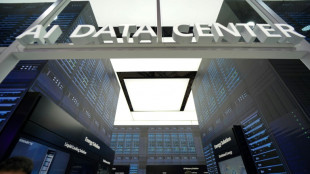 Tech giants scramble to meet AI's looming energy crisis
Tech giants scramble to meet AI's looming energy crisis
-
Trump sours on Putin, but bromance may not be over

-
 Supreme Court allows Trump to resume Education Department dismantling
Supreme Court allows Trump to resume Education Department dismantling
-
SAINT BELLA Debuts in the U.S., Setting a New Standard for Postpartum Care

-
 IXOPAY Surges Past 500 Certified Adapters, Solidifies Leadership in Enterprise-Grade Payment Orchestration
IXOPAY Surges Past 500 Certified Adapters, Solidifies Leadership in Enterprise-Grade Payment Orchestration
-
NBA Sixers forward George undergoes left knee surgery

-
 US House set to vote on landmark crypto bills this week
US House set to vote on landmark crypto bills this week
-
US pro athletes reject antitrust exemptions for college sports

-
 Three things we learned from the third England-India Test
Three things we learned from the third England-India Test
-
Starc inspires Australia as West Indies all out for 27

-
 Wembanyama cleared to return for NBA Spurs: reports
Wembanyama cleared to return for NBA Spurs: reports
-
You're a TV star, Harry: Potter series to debut in 2027

-
 Syrian forces advance on Sweida as Druze leader says truce talks underway
Syrian forces advance on Sweida as Druze leader says truce talks underway
-
Starc claims 400th wicket as West Indies crumble

-
 Elon Musk's xAI inks Pentagon deal for contentious Grok chatbot
Elon Musk's xAI inks Pentagon deal for contentious Grok chatbot
-
Ukraine's Zelensky proposes new PM, defence minister in major reshuffle

-
 England captain Stokes wants to 'lie on my bed' after India nail-biter
England captain Stokes wants to 'lie on my bed' after India nail-biter
-
Trump gives Russia 50 days to make Ukraine deal

-
 Spreading Grand Canyon fire destroys historic lodge
Spreading Grand Canyon fire destroys historic lodge
-
US ice cream makers to scoop out synthetic dyes under RFK Jr. push

-
 AC Milan confirm Modric arrival
AC Milan confirm Modric arrival
-
Real Madrid sign Benfica's Carreras to continue summer rebuild

-
 Almost 100 killed as Syria sectarian clashes rage
Almost 100 killed as Syria sectarian clashes rage
-
England's Bashir out of remainder of India series

-
 England take 2-1 series lead over India with thrilling Lord's win
England take 2-1 series lead over India with thrilling Lord's win
-
England take 2-1 series lead over Inda with thrilling Lord's win

-
 Trump gives Russia 50 days to make Ukraine deal or face sanctions
Trump gives Russia 50 days to make Ukraine deal or face sanctions
-
Healy becomes first Irishman in 38 years to lead the Tour de France

-
 'Sesame Street' puppet Elmo's hacked X account calls for Jews' extermination
'Sesame Street' puppet Elmo's hacked X account calls for Jews' extermination
-
England win third Test thriller against India at Lord's


Tech giants scramble to meet AI's looming energy crisis
The artificial intelligence industry is scrambling to reduce its massive energy consumption through better cooling systems, more efficient computer chips, and smarter programming -- all while AI usage explodes worldwide.
AI depends entirely on data centers, which could consume three percent of the world's electricity by 2030, according to the International Energy Agency. That's double what they use today.
Experts at McKinsey, a US consulting firm, describe a race to build enough data centers to keep up with AI's rapid growth, while warning that the world is heading toward an electricity shortage.
"There are several ways of solving the problem," explained Mosharaf Chowdhury, a University of Michigan professor of computer science.
Companies can either build more energy supply -- which takes time and the AI giants are already scouring the globe to do -- or figure out how to consume less energy for the same computing power.
Chowdhury believes the challenge can be met with "clever" solutions at every level, from the physical hardware to the AI software itself.
For example, his lab has developed algorithms that calculate exactly how much electricity each AI chip needs, reducing energy use by 20-30 percent.
- 'Clever' solutions -
Twenty years ago, operating a data center -- encompassing cooling systems and other infrastructure -- required as much energy as running the servers themselves.
Today, operations use just 10 percent of what the servers consume, says Gareth Williams from consulting firm Arup.
This is largely through this focus on energy efficiency.
Many data centers now use AI-powered sensors to control temperature in specific zones rather than cooling entire buildings uniformly.
This allows them to optimize water and electricity use in real-time, according to McKinsey's Pankaj Sachdeva.
For many, the game-changer will be liquid cooling, which replaces the roar of energy-hungry air conditioners with a coolant that circulates directly through the servers.
"All the big players are looking at it," Williams said.
This matters because modern AI chips from companies like Nvidia consume 100 times more power than servers did two decades ago.
Amazon's world-leading cloud computing business, AWS, last week said it had developed its own liquid method to cool down Nvidia GPUs in its servers - - avoiding have to rebuild existing data centers.
"There simply wouldn't be enough liquid-cooling capacity to support our scale," Dave Brown, vice president of compute and machine learning services at AWS, said in a YouTube video.
- US vs China -
For McKinsey's Sachdeva, a reassuring factor is that each new generation of computer chips is more energy-efficient than the last.
Research by Purdue University's Yi Ding has shown that AI chips can last longer without losing performance.
"But it's hard to convince semiconductor companies to make less money" by encouraging customers to keep using the same equipment longer, Ding added.
Yet even if more efficiency in chips and energy consumption is likely to make AI cheaper, it won't reduce total energy consumption.
"Energy consumption will keep rising," Ding predicted, despite all efforts to limit it. "But maybe not as quickly."
In the United States, energy is now seen as key to keeping the country's competitive edge over China in AI.
In January, Chinese startup DeepSeek unveiled an AI model that performed as well as top US systems despite using less powerful chips -- and by extension, less energy.
DeepSeek's engineers achieved this by programming their GPUs more precisely and skipping an energy-intensive training step that was previously considered essential.
China is also feared to be leagues ahead of the US in available energy sources, including from renewables and nuclear.
P.M.Smith--AMWN
